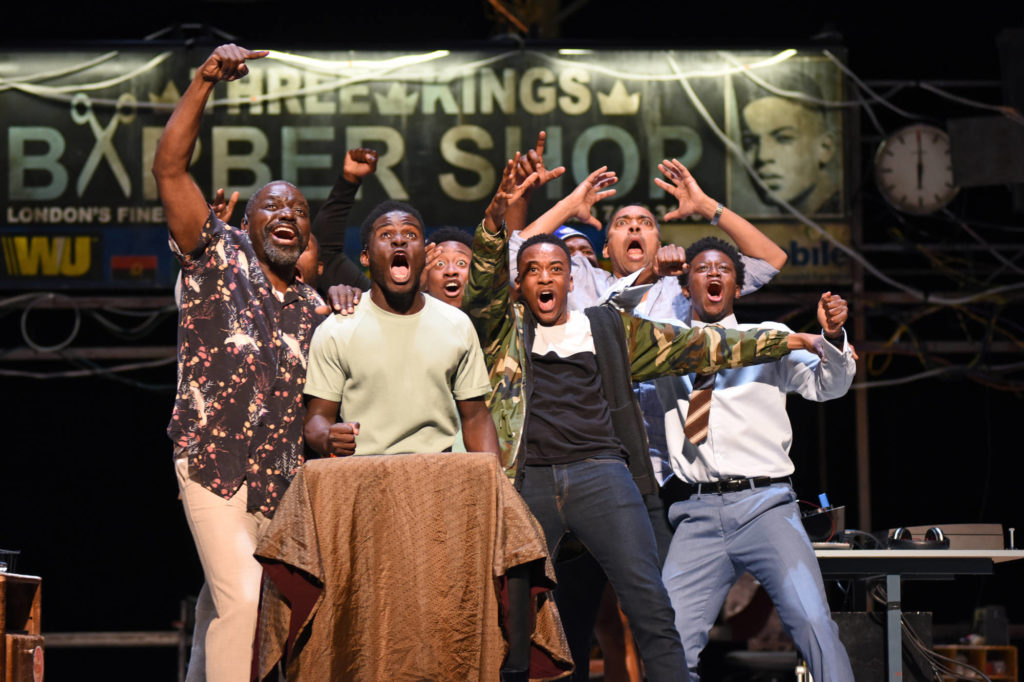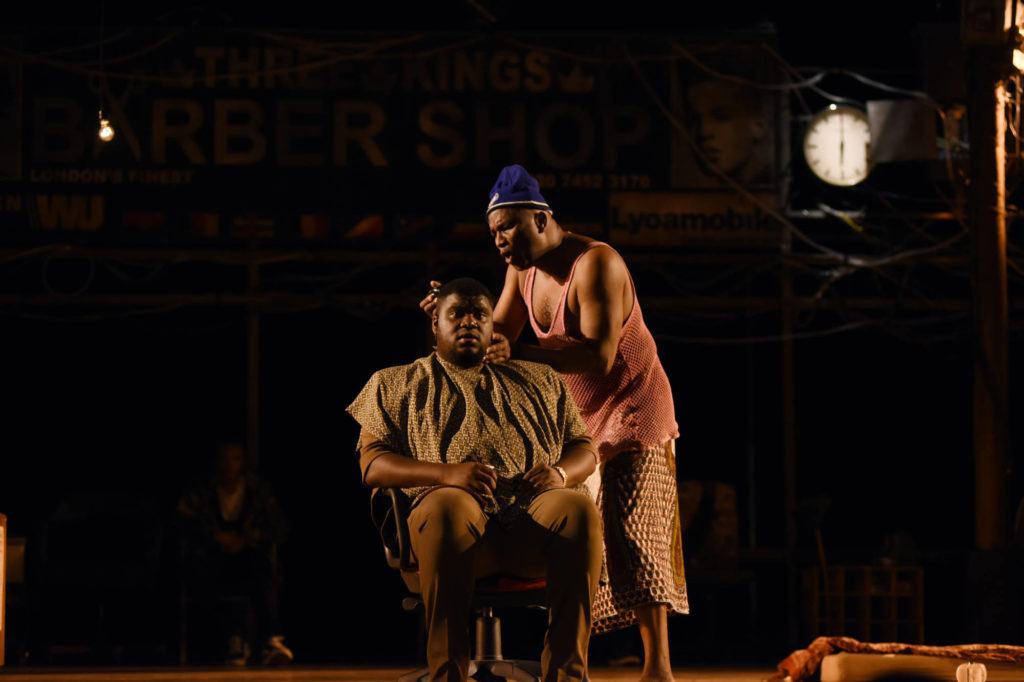
by Mike Hoban
‘Barber Shop Chronicles’ – Written by Inua Ellams; Directed by Bijan Sheibani; Set Design by Rae Smith; Lighting Design by Jack Knowles; Sound Design by Gareth Fry; Music Direction by Michael Henry; Movement Direction by Aline David. Co-produced by Fuel, National Theatre, and West Yorkshire Playhouse. Presented by American Repertory Theater at the Loeb Drama Center, 64 Brattle St. Cambridge, through Jan. 5.
Ever since the release of the movie series of the same name in the early 2000’s, I’ve pretty much thought of the “Barber Shop” as the social and cultural domain of African-American men. It had never occurred to me before seeing Barber Shop Chronicles (now playing at the A.R.T.), that the same elements that made barber shops a safe haven for black men in the U.S. – namely, a place where they could gather and express themselves without the judgement/harassment of an often hostile society – were also a cultural institution in other corners of the world, despite knowing that those same conditions existed pretty much everywhere, including the African continent.
So when the play opens, and it’s not set in a place like say, Sly’s Barber Shop in Cambridge (“Braids, Dreads, Natural Hair”), but in in a one-room shop where the proprietor sleeps on the floor and powers his electric clippers and trimmers with a gas-driven generator in Lagos, Nigeria – it was a bit of a surprise. It’s where we meet Wallace, a young man who comes pounding on the shop’s door at 6AM, desperately needing a haircut for a job interview. The owner/barber Tokumbo relents and opens up his shop, and while Wallace gets his trim, the two are soon engaged in the kind of slice of life stuff you don’t generally hear in a theatrical production.

The play takes us to multiple barber shops in Lagos, Johannesburg, Harare (Zimbabwe), Accra (Ghana), Kampala (Uganda), and London during the course of a single day, and the guys talk about the things you’d expect from any gathering of men, like sports (specifically, a Barcelona vs Chelsea futbol match) and politics (the strengths and weaknesses of both Mandela and Mugabe). But there are also deeper conversations, as the dozen characters discuss the relative merits of physical punishment of children; the importance of Pidgin English to maintaining their cultural identity; the proper use of racial slurs; and most strikingly, their relationships with their own fathers (‘I’m your father – not your friend,” says one character, quoting his dad).
Playwright Inua Ellams cleverly interconnects the men from the different locations through their storytelling, and the reciting of the same new joke at each of the far-flung barber shops – located hundreds of miles apart – drives that point home. The play is not just a series of vignettes, but 14 well-developed scenes, with strong narratives running through each of the locations. The most interesting conversations revolve around the various ways that men relate to their fathers, and it is this narrative that (for me) provided the evening’s single most compelling storyline. Simphiwe (Patrice Naiambana), whose alcoholic father abandoned him, is repeating the same behavior with his own son, drunkenly lamenting in a South African barber shop that he doesn’t see him. Meanwhile, we see his son at a London barbershop, sharing that he grew up essentially fatherless, while not knowing that his father is dying to reconnect, Googling the young man on a daily basis and telling his barber how proud he is of his son. It’s a touching piece that underlines just how gifted a storyteller Ellams is.

There are other strong storylines as well, particularly in the London and Lagos locations. An added bonus is the music and movement used to choreograph scene changes, featuring hip-hop music and dance as the cast changes from one location to the next. The one lament I have with the production is that, much like the Abbey Theatre’s production of The Plough and the Stars at the A.R.T. a couple of years ago, the accents and colloquialisms can make it difficult to fully understand what the actors are saying, so it requires a heightened level of concentration. But this is a minor quibble, as the stories and performances make for a great evening’s entertainment. As one character says towards the end of the play, “Even for dark times, the barber shop (is a) lighthouse, a beacon for the community where men come to be men.” This production makes that crystal clear, whether you’re in Cambridge or Zimbabwe. For tickets and information, go to: https://americanrepertorytheater.org/shows-events/barber-shop-chronicles/

